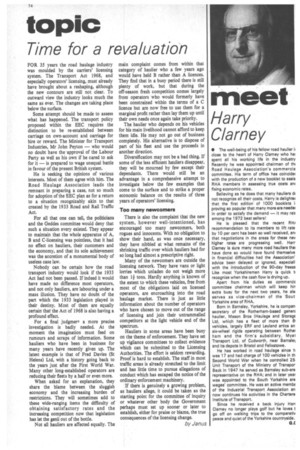topic
Page 80

If you've noticed an error in this article please click here to report it so we can fix it.
Time for a revaluation
FOR 35 years the road haulage industry was moulded by the carriers' licensing system. The Transport Act 1968, and especially operators' licensing, must already have brought about a reshaping, although the new contours are still not clear. To outward view the industry looks much the same as ever. The changes are taking place below the surface.
Some attempt should be made to assess what has happened. The transport policy proposed within the EEC requires the distinction to be re-established between carriage on own-account and carriage for hire or reward. The Minister for Transport Industries, Mr John Peyton — who would no doubt have the approval of the Labour Party as well as his own if he cared to ask for it — is prepared to wage unequal battle in favour of the present British system.
He is seeking the opinions of various interests. Most of them agree with him. The Road Haulage Association leads the remnant in preparing a case, not so much for adoption of the EEC plan as for a return to a situation recognizably akin to that created by the 1933 Road and Rail Traffic Act.
For all that one can tell, the politicians and the Geddes committee would deny that such a situation every existed. They appear to maintain that the whole apparatus of A, B and C-licensing was pointless, that it had no effect on hauliers, their customers and the economy, and that its sole achievement was the accretion of a monumental body of useless case law.
Nobody can be certain how the road transport industry would look if the 1933 Act had not been passed. If indeed it would have made no difference most operators, and not only hauliers, are labouring under a mass illusion. They have no doubt of the part which the 1933 legislation played in their destiny. Most of them are equally certain that the Act of 1968 is also having a profound effect.
For a final judgmert a more precise investigation is badly needed. At the moment the imagination must feed on rumours and scraps of information. Some hauliers who have been in business for many years have recently given up. The latest example is that of Fred Davies (St Helens) Ltd, with a history going back to the years just after the First World War. Many other long-established operators are reducing their fleets by a half or even more.
When asked for an explanation, they share the blame between the sluggish economy and the increasing burden of restrictions. They will sometimes add to these wide-ranging items the difficulty of obtaining satisfactory rates and the increasing competition now that legislation has let the genii out of the bottle.
Not all hauliers are affected equally. The main complaint comes from within that category of haulier who a few years ago would have held B rather than A licences. They find that in a busy period there is still plenty of work, but that during the off-season fresh competition comes largely from operators who would formerly have been constrained within the terms of a C licence but are now free to use them for a marginal profit rather than lay them up until their own needs once again take priority.
The haulier who depends on his vehicles for his main livelihood cannot afford to keep them idle. He may not go out of business completely. His alternative is to dispose of part of his fleet and use the proceeds in another direction.
Diversification may not be a bad thing. If some of the less efficient hauliers disappear, they will be mourned by few except their dependants. There would still be an advantage in a comprehensive attempt to investigate below the few examples that come to the surface and to strike a proper economic balance on the results of three years of operators' licensing.
Too many newcomers There is also the complaint that the new system, however well-intentioned, has encouraged too many newcomers, both rogues and innocents. With no obligation to show their hand, as was once necessary, they have nibbled at what remains of the shrinking traffic over which hauliers had for so long had almost a prescriptive right.
Many of the newcomers are outside the licensing network, They have vans or light lorries which unladen do not weigh more than tons. Hardly anything is known of the extent to which these vehicles, free from most of the obligations laid on licensed operators, are encroaching into the road haulage market. There is just as little information about the number of operators who have chosen to move out of the range of licensing and join their untrammelled competitors at the light vehicle end of the spectrum.
Hauliers in some areas have been busy on the theme of enforcement. They have set up vigilance committees to collect evidence which can be submitted to the Licensing Authorities. The effort is seldom rewarding. Proof is hard to establish. The staff in most traffic areas is already stretched to the limit and has little time to pursue allegations of conduct which has escaped the notice of the ordinary enforcement machinery.
If there is genuinely a growing problem, as hauliers allege, it could be taken as the starting point for the committee of inquiry or whatever other body the Government perhaps must set up sooner or later to establish, either for praise or blame, the true consequences of the licensing change.
































































































































































